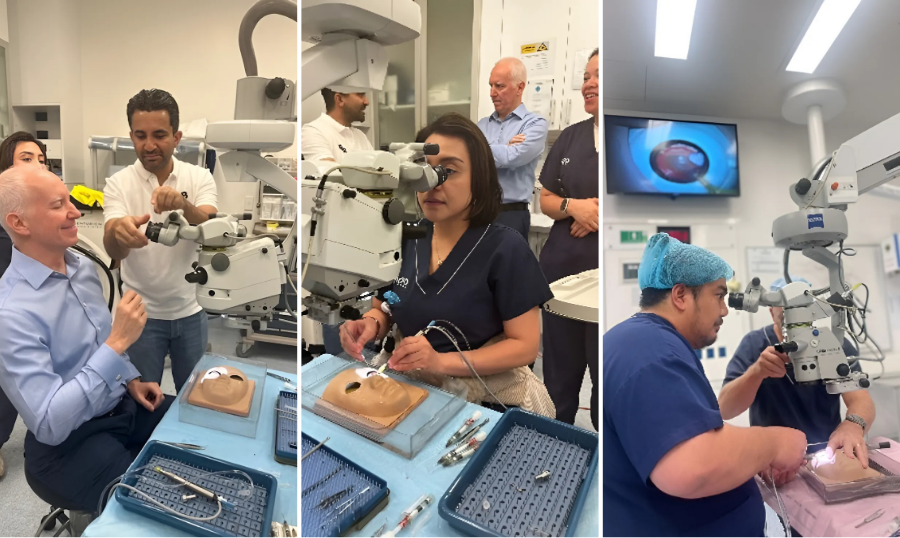Auckland Eye sets new standard in digital accessibility with website toolbar launch
Discover how Auckland Eye is redefining inclusive healthcare by launching New Zealand’s first assistive website toolbar.

Did you know that women make up 2/3 of those living with blindness or visual impairment?
Fortunately, women can take certain steps to maintain eye health, including…

A study by PBA (Vision Problems in the US) in 2013 found that more women than men have age-related macular degeneration, cataracts, glaucoma, and diabetic retinopathy. According to the National Eye Institute, the primary causes for this finding is due to longevity as well as hormonal factors.
Autoimmune diseases like multiple sclerosis, lupus, and rheumatoid arthritis affect women three times more than men. This higher prevalence is partly attributable to the X chromosome, which has many genes relating to the immune system. Issues with vision are one of the serious side effects arising from these conditions. Since women tend to look after the well-being of their family, to their own detriment, women tend to be more susceptible to overlooking their own health, including their vision.
Therefore to help protect your long-term visual health, it is important that you have a comprehensive eye exam at least every couple of years, especially after the age of 40. Additionally, women over the age of 60 should plan on more frequent visits with one of our ophthalmologists. When detected early on, most eye diseases can be treated or significantly slowed.

Dry eye syndrome can result in decreased vision, as well as irritation, redness, and pain. Due to hormonal balance changes, women have a higher prevalence of this condition. In particular, due to hormonal changes and a decreased production in tear fluid, Dry Eye Syndrome is most prevalent in menopausal and postmenopausal women. Additionally, women who are pregnant or on certain types of birth control can experience Dry Eye Syndrome as well.
If you are searching for effective relief from dry and uncomfortable eyes, our leading-edge Dry Eye treatment at Oasis Spa might be just what you are looking for! Come in for an assessment at Oasis Dry Eye Spa to receive a full clinical evaluation of the likely cause of your Dry Eye and be provided with a tailored treatment plan.
Throughout your tailored treatment plan, you will have access to proven, state-of-the-art dry eye technology including LipiFlow and Lumenis Optima IPL and your treatment will be delivered by our expertly trained team. Our aspiration is to give you long term relief and comfort to provide you with the freedom to enjoy life without the discomfort caused by Dry Eye Syndrome.

Just like other parts of your body like your heart, brain and lungs, your eyes are affected by how you take care of your body. Therefore, alongside having a healthy balanced diet, regular exercise can help fight against eye conditions linked to obesity and being out of shape.

Good blood glucose control reduces the risks of complications developing for the mother and baby. Therefore, expectant women with diabetes should see their eye doctor during pregnancy also due to their increased risk of developing diabetic retinopathy.
Poor control of blood sugar levels and elevated blood pressure levels can increase your risk of blindness resulting from cataracts or diabetic retinopathy. Aim to keep your blood pressure and blood sugar levels within a normal range by keeping tabs of your health numbers and maintaining a healthy lifestyle.

If your work or hobbies (contact sports, gardening) involves a high risk of eye injury, be sure to wear the correct eyewear to protect your eyes from potential injuries or infections.

Wearing sunglasses with UV protection can slow the development of cataracts and protect against other types of sun damage (photokeratitis, or sunburned eyes, for example).
The best way to protect your eyes from ultraviolet radiation (UVR) exposure is to wear sunglasses with 100% protection against UVA and UVB rays. Also, make sure you find a wrap-around style of sunglasses that gives you maximum coverage so that the sun’s rays can’t enter from the side.

Eye infections related to improper contact lens wear and care are serious and can lead to long-lasting damage, but they are often preventable by following these steps:

For many reasons, knowing your family history often proves helpful. This is definitely true with regard to eye health since many eye diseases are hereditary. By knowing what conditions your ancestors have had, you can notify your eye care professional of what those conditions are and, in some cases, do things to prevent or lessen the effect of those conditions you may be genetically predisposed to.

The purpose of this month is to get women to at least for a little while focus on themselves to protect their long-term vision health. Therefore in honour of Women’s Eye Health and Safety Month, we suggest you schedule your annual eye exam with us today! Our wonderful team are committed to helping women (and men) of all ages maintain optimum eye health.
To book an appointment with one of our highly experienced and knowledgeable ophthalmologists for a comprehensive eye exam, call 0800 255 393. Additionally, if you suffer from chronic dry eyes, you can book your introductory assessment with our Dry Eye specialist team by emailing to oasisspa@aucklandeye.co.nz.
We look forward to welcoming you!

Discover how Auckland Eye is redefining inclusive healthcare by launching New Zealand’s first assistive website toolbar.

Macular degeneration is a leading cause of vision loss in older adults. There’s no cure, but its progression can be slowed. Here’s what to know.

Auckland Eye hosted an extraordinary Continued Medical Education (CME) day titled “Walk in Our Surgeons’ Shoes (Socks)”.